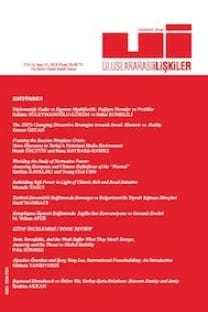11 Eylül’den 10 Yıl Sonra Terörizm Çalışmaları: Başarılar, Konular ve Sorunlar
Bu makale 11 Eylül sonrası dönem terrör çalışmalarını kat edilen gelişme, öne çıkan konu başlıkları ve gelecekte karşılaşılabilecek sorunlar merkezinde incelemektedir. Makalede terör çalışmalarının 11 Eylül sonrasındaki on yıllık dönemde gelişerek olguluğa ulaştığı iddia edilmektedir. Bunda konunun üniveritelerde kurulan yeni eğitim programalarında, düşünce kuruluşlarında ve araştırma merkezlerinde akademik bir faaliyet alanı olarak görülerek popülerleştirlmesinin etken olduğu belirtilmelidir. Çalışmalar, konuya kenidisini adayan araştırmacılar sayesinde metodoloji ve konu çeşitliliği anlamında zenginleştiyse de çok sayıda sorun varlığını devam ettirmektedir. Makale alanda karşılaşılan çeşitli sorunların değerlendirmesiyle sonuçlanmaktadır. Kısacası çalışma, terör çalışmaları açısından günümüzün fırsatları barındıran bir zaman dilimi olduğu ve terörizm araştırmalarının gelecek on yılından da umutlu olunması gerektiği sonucuna varmaktadır.
Anahtar Kelimeler:
11 Eylül, Terörizmle Mücadele, Sorun çözümü, Eleştirel Terörizm Çalışmalarıı, Terörizm Çalışmaları
The Study of Terrorism 10 Years After 9/11: Successes, Issues, Challenges
This article surveys the field of terrorism studies since 9/11 and attempts to assess some of its main successes, perennial issues and future challenges. It suggests that terrorism studies has grown and matured in the decade since the attacks, in part through its rising popularity and institutionalization in new university teaching programs, a growing number of think tanks and research institutes, and scholarly activity in new networks and journals. While some of its successes include new dedicated scholars and researchers, improving standards of scholarship, and diversification of research and methodological approaches (including the rise of critical terrorism studies), a number of perennial issues continue to haunt the field. These include, among others: tendencies towards decontextualisation, de-historicisation and knowledge subjugation within the field; skewed research priorities; normative-political issues surrounding policy engagement and problem-solving; the lack of reflexivity and engagement with critical terrorism studies and other critical movements; and the low entry barriers to terrorism expertise and the rise of pseudo-experts. The article concludes with a discussion of some of the main challenges facing the field, such as avoiding a bifurcation into critical and orthodox intellectual ghettos, bridging the trans-Atlantic divide between scholars, negotiating the complex legal environment posed by domestic counter-terrorism legislation, developing standards and safeguards for primary research and integrating the relevant knowledge of cognate fields such as peace studies into the research and teaching of terrorism studies. Overall, the article concludes that it is an opportune time to be involved in terrorism studies and there reasons for being cautiously optimistic about the next decade of terrorism research
Keywords:
Terrorism Studies 9/11, War on Terror, Counter-terrorism, Problem-solving, Critical Terrorism Studies,
___
- .....
- ISSN: 1304-7310
- Başlangıç: 2004
- Yayıncı: Uluslararası İlişkiler Konseyi Derneği İktisadi İşletmesi
Sayıdaki Diğer Makaleler
11 Eylül’den 10 Yıl Sonra Terörizm Çalışmaları: Başarılar, Konular ve Sorunlar
‘Eski’ Terörizm ‘Yeni’ Terörizme Karşı: İsim Ne İfade Ediyor?
Ken BOOTH ve Tim DUNNE, Çağımızda Terör
“Yeni Terörizm”i Tanımlamak: Küresel Risk Toplumunda Düşmanın Yeniden Yapılandırılması
‘Terörle Mücadele’ ve Hegemonya: 11 Eylül Sonrasında Terörizm Bağlamında Uluslararası Hukuk Oluşumu
Ortadoğu’da Terörle Mücadele Aracı Olarak Demokrasi: Kandırmaca mı?
Terörizm Hala Demokratik Bir Olgu mu?
Korkmamız Gereken Tek Şey: 11 Eylül Sonrasında Güvensizliğin Kurumsallaşması
